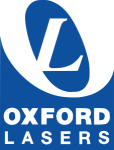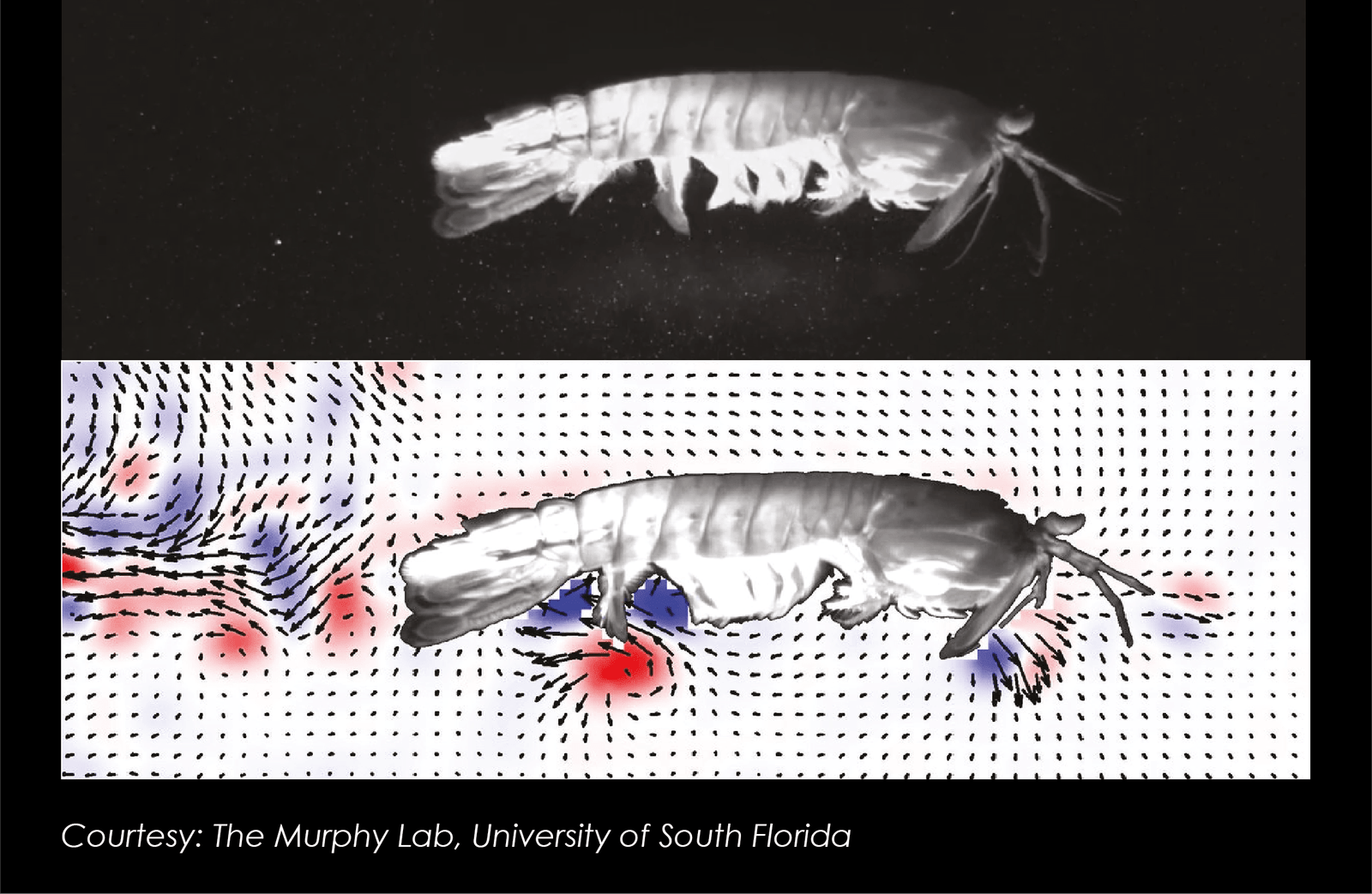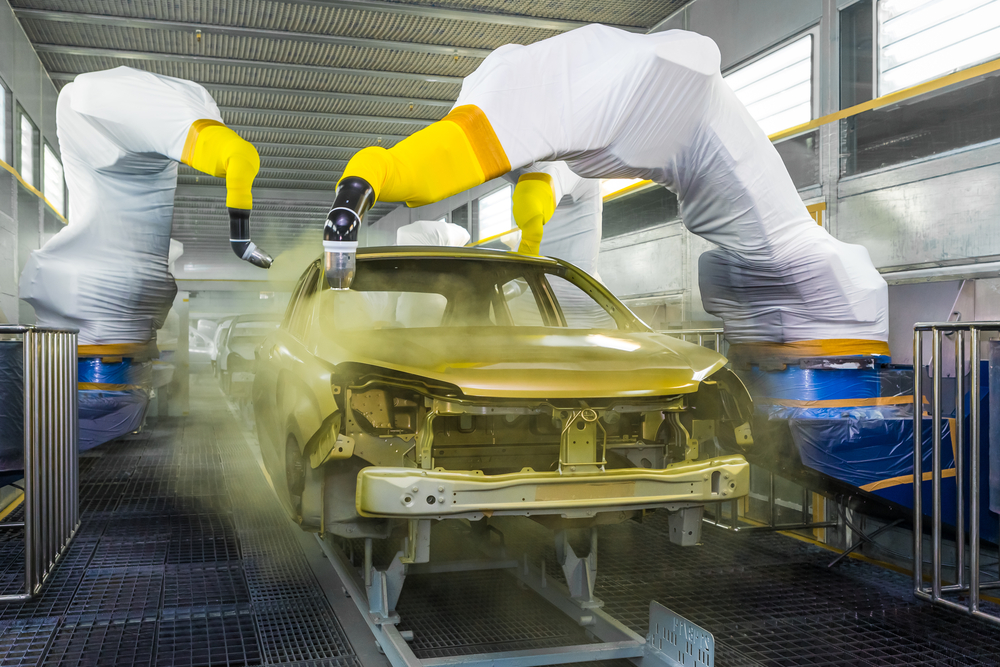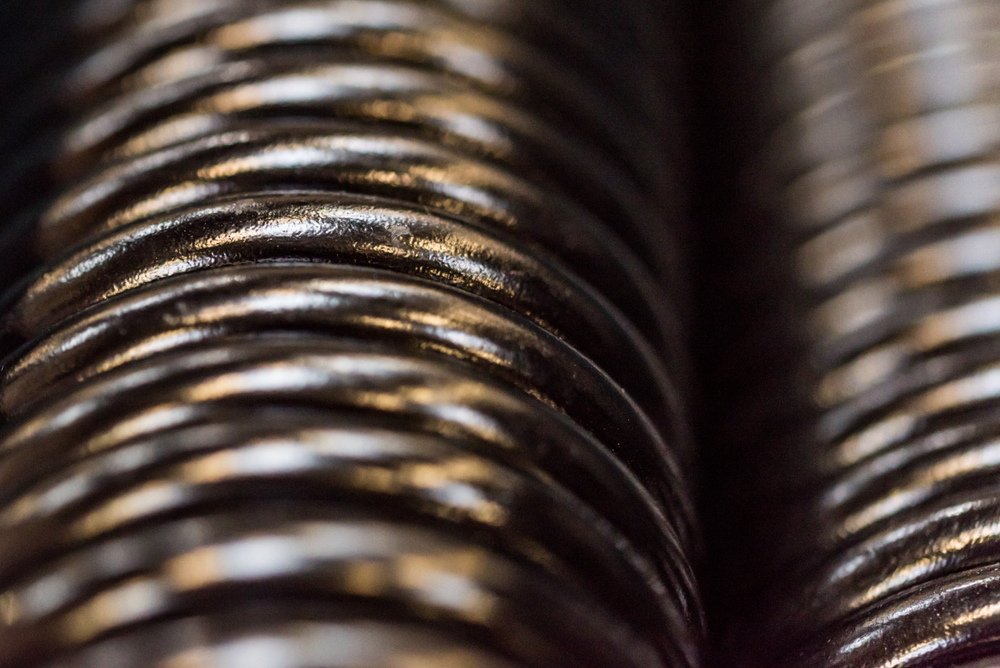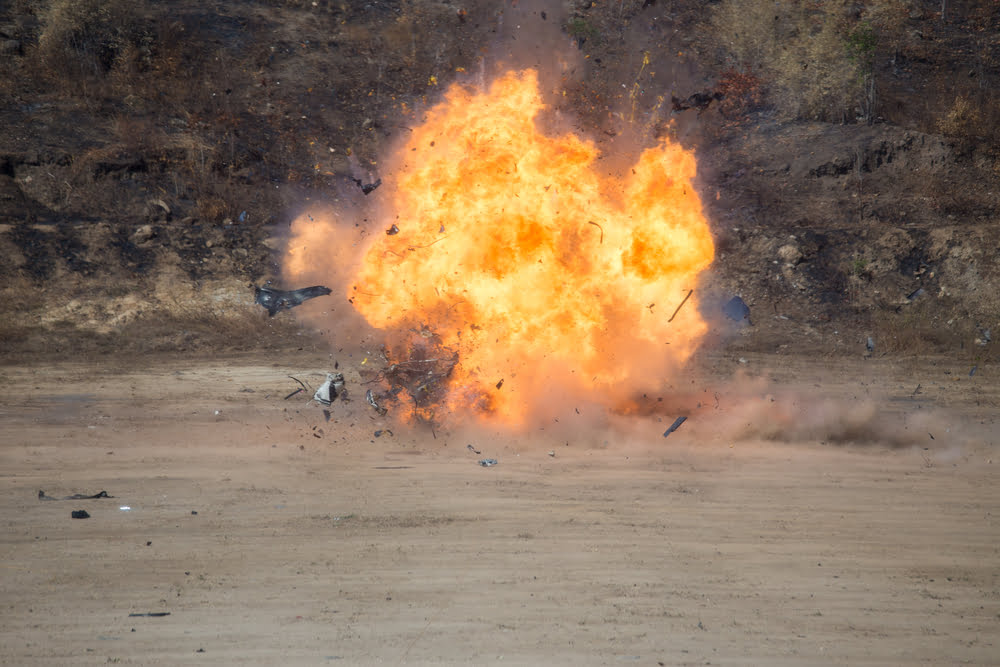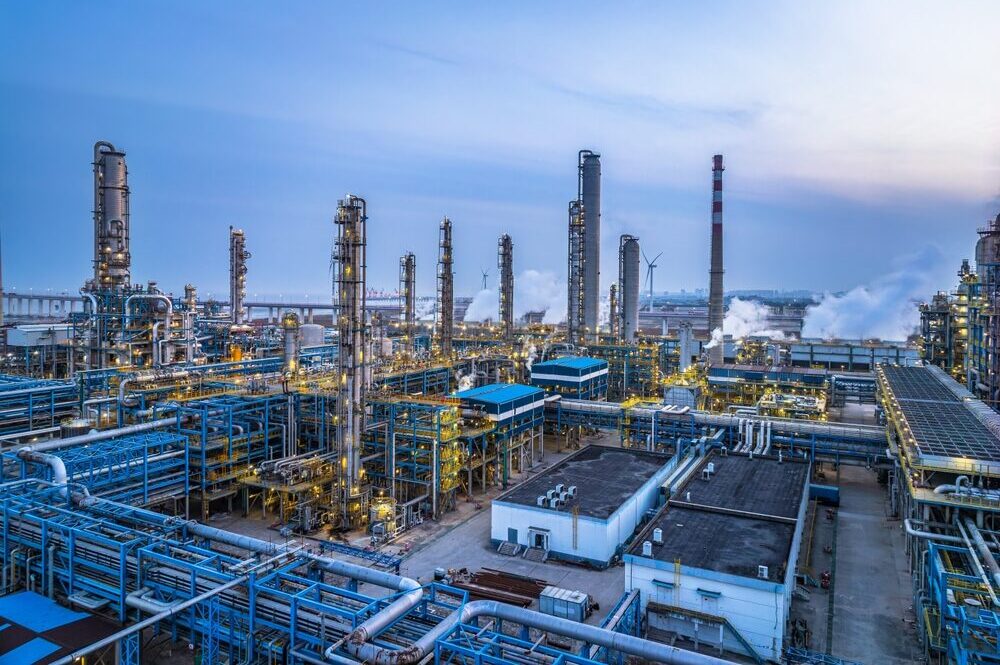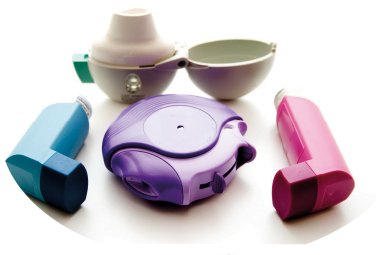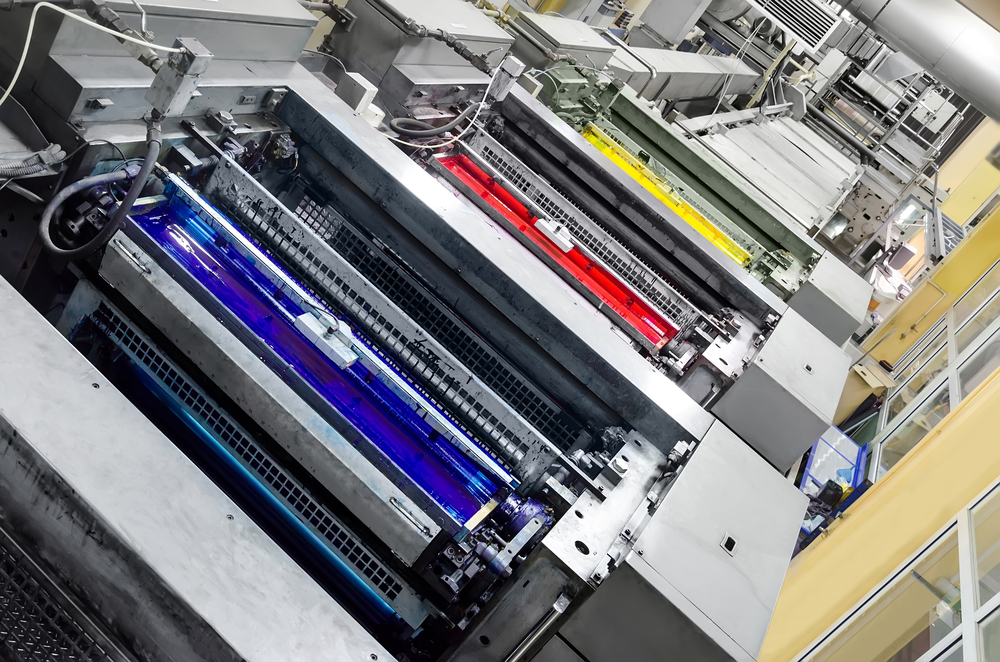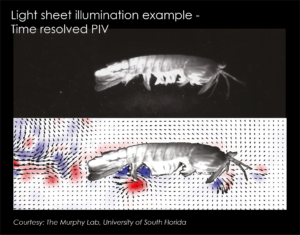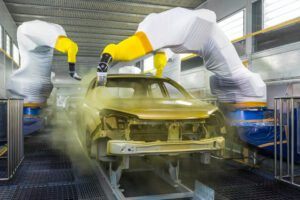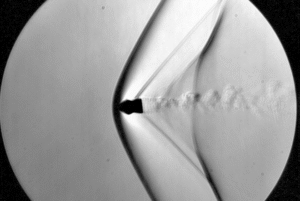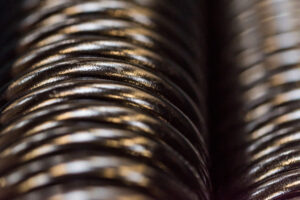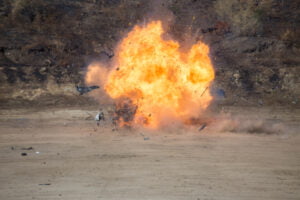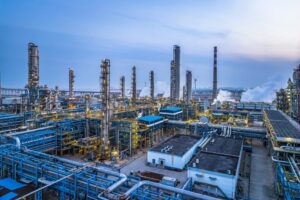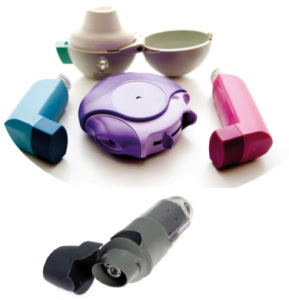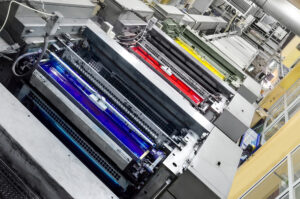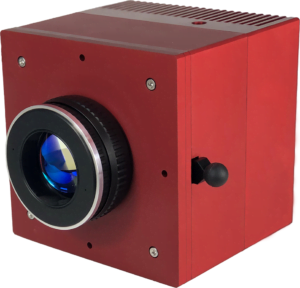Laser Illumination Applications & Industries
Our imaging FireBIRD and FireFLY laser illumination products enable visualisation and analyses that standard techniques struggle to achieve. Ultra-fast, short-pulse laser illumination opens the doors to high-speed imaging applications.
Browse our Laser Illumination Applications by Industry
Academia / R&D
Fluid Mechanics and Pipe Flow Imaging
Oxford Lasers’ systems provide illumination for blur-fee, detailed images to understand the dynamic process in fluids including the study of pipe flows. Our FireFLY laser illumination systems use light sheets to enable advanced imaging techniques such as Particle Image Velocimetry (PIV) to measure fluid flow.
Publications FireBIRD / FireFLY in Fluid Mechanics
| Mendelson L, Techet AH “On analysis of circulation, impulse, and force in propulsive wakes using 3DPIV.” 11th International Symposium on Particle Image Velocimetry, Santa Barbara, CA, USA (September 2015) |
Biolocomotion Studies
Oxford Lasers’ FireBIRD and FireFLY systems provide illumination for blur-free, detailed images in the study of biolocomotion. Our systems use a light sheet to capture the effect of bodies in motion in a fluid environment such as a study conducted at the University of Florida to analyse the movement of a Mantis Shrimp through water.
Publications FireBIRD / FireFLY in Biolocomotion Studies
| Fiore G, Anderson E, Garborg CS, Murray M, Johnson M, Moore MJ, et al. (2017) From the track to the ocean: Using flow control to improve marine bio-logging tags for cetaceans. PLoS ONE 12(2): e0170962 |
| Mendelson, L. & Techet, A.H. Exp Fluids (2018) 59: 10. https://doi.org/10.1007/s00348-017-2468-x |
| Leah Mendelson and Alexandra H. Techet. On analysis of circulation impulse and force in propulsive wakes using 3DPIV. 11th International symposium on Particle Image Velocimetry 2015. |
| F.G. Ergin, et al., Pixel-accurate dynamic masking and flow measurements around small breaststroke-swimmers using long distance MicroPIV. 11th International Symposium on particle Image Velocimetry. September 14-16 2015. |
| Deepak Adhikari et al., 2015. Simultaneous measurement of 3D zooplankton trajectories and surrounding fluid velocity field in complex flows. Journal of experimental biology (2015) 218, 3534-3540. |
| Jeanette D. Wheeler et al., Isolating the hydrodynamic triggers of the dive response in eastern oyster larvae. Limnology and Oceanography. 2015. |
| Hiroyuki Yoshida, et al., Particle Image Velocimetry Evaluation of Fluid Flow Profiles in USP 4 Flow Through Dissolution Cells. Pharm Res. 2015. |
| Navish Wadhwa, et a., Hydrodynamics and energetics of jumping copepod nauplii and copepodids. The Journal of Environmental Biology 2014. |
| Kakani Katija et al., Ontogenetic propulsive transitions by medusa Sarsia tubulosa. The Journal of Experimental Biology. 2015. |
| Kakani Katija and Houshuo Jiang. Swimming by meusae Sarsia tubulosa in the viscous vortex ring limit. Limnology and Oceanography: Fluids and Environments 3 (2013) 103-118. |
| 2020 Khosronejad Ali Article Water Exit Dynamics of Jumping archer fish int 2 phase flow large eddy sim Phys. Fluids 32, 011904 (2020); doi 10.10631.5130886 |
| Gemmell BJ, Adhikari D, Longmire EK. 2014 Volumetric quantification of fluid flow reveals fish’s use of hydrodynamic stealth to capture evasive prey. J. R. Soc. Interface 11: 20130880. http://dx.doi.org/10.1098/rsif.2013.0880 |
| Krizan, Daniel. (2014). Copepod response behavior in turbulence. Retrieved from the University of Minnesota Digital Conservancy, http://hdl.handle.net/11299/167294. |
Spray Characterisation
Oxford Lasers’ FireBIRD and FireFLY systems provide powerful, short-pulsed laser illumination for blur-free, detailed images of sprays and particles in flight in high-speed imaging for better insight into spray characterisation and projectile behaviour.
Paired with Oxford Lasers’ VisiSize P15+ and N60 systems to provide droplet sizing information, our analytical tools calculate size, shape and velocity of a variety of particles including droplets, liquid in liquid droplets, solid particles, spray-dried food products and air inclusions in agricultural sprays. We provide you the solution to understanding your product and process development.
- Spray characterisation
- Spray drift
- Spray quality
Publications FireBIRD / FireFLY in Spray Characterisation
| Ju, D., Shrimpton, J.S. and Hearn, A. (2012), A Multi-Thresholding Algorithm for Sizing out of Focus Particles. Part. Part. Syst. Charact., 29: 78-92. |
Turbulence Imaging
Oxford Lasers’ FireBIRD and FireFLY systems provide short-pulsed laser illumination to enable advanced imaging techniques of dynamic processes in liquids and air. Our laser systems enable blur-free, detailed images when paired with a high-speed camera for use in Schlieren and Particle Image Velocimetry (PIV) imaging techniques to capture images of turbulence including shockwaves and other subjects. Incorporating our VisiSize P15+ or VisiSize N60 droplet sizing system, we enable the imaging and sizing of bubbles in cavitation studies to understand the development of bubbles during turbulence.
Publications FireBIRD / FireFLY in Turbulance Studies
| Krizan, Daniel. (2014). Copepod response behavior in turbulence. Retrieved from the University of Minnesota Digital Conservancy, http://hdl.handle.net/11299/167294. |
Ion Exchange Imaging
Oxford Lasers’ FireBIRD and FireFLY systems provide short-pulsed, laser illumination for advanced imaging techniques of dynamic processes in liquids and air. Our laser systems enable blur-free, detailed images using Schlieren and PIV imaging techniques to capture dynamic processes.
Publications FireBIRD / FireFLY in Ion Exchange Studies
| De Valenca, J. (2017). Overlimiting current properties at ion exchange membranes. Universiteit Twente. https://doi.org/10.3990/1.9789036543149 |
Hydrodynamics Imaging
Oxford Lasers’ FireBIRD and FireFLY systems provide short-pulsed, laser illumination for advanced imaging techniques of dynamic processes in liquids as well as air. Our laser systems enable blur-free, detailed images using Schlieren and PIV imaging techniques to capture the greatest details.
Publications FireBIRD / FireFLY in Hydrodynamics Studies
| Dijkshoorn J. P. de Valença C. Wagterveld R. M. Boom R. M. Schutyser M. A. I. Visualizing the hydrodynamics in sieve-based lateral displacement systems |
Vortex Rings Studies
Oxford Lasers’ FireBIRD and FireFLY systems provide short-pulsed, laser illumination for advanced imaging techniques of dynamic processes in liquids and air. Our laser systems enable blur-free, detailed images using Schlieren imaging techniques and PIV to capture images of turbulence, shockwaves, vortexes or other subjects to understand their affects and impacts.
Publications FireBIRD / FireFLY in Vortex Ring Studies
| Casanellas L, Ortin J, Vortex ring formation in oscillatory pipe flow of wormlike micellar solutions Journal of Rheology 58, 149 (2014) |
Liquid / Liquid Separator Imaging
Oxford Lasers’ FireBIRD and FireFLY systems provide illumination for advanced imaging techniques of dynamic processes in liquids and air. Our laser systems enable blur-free, detailed images using Schlieren imaging techniques and PIV advanced imaging techniques to better understand liquid behaviour.
Publications FireBIRD / FireFLY in Liquid/Liquid Separator Studies
| Sveier M. Study of the droplet-interface dynamic related to the liquid-liquid separator. |
Liquid / Liquid Interface Imaging
Oxford Lasers’ FireBIRD and FireFLY systems provide illumination for advanced imaging techniques of dynamic processes in liquids and air. Our laser systems enable blur-free, detailed images using Schlieren imaging techniques and PIV advanced imaging techniques to better understand liquid behaviour.
Publications FireBIRD / FireFLY in Liquid/Liquid Interface Studies
| M.S.P. Stevar, A. Vorobev,Shapes and dynamics of miscible liquid/liquid interfaces in horizontal capillary tubes Journal of Colloid and Interface Science,Volume 383, Issue 1,2012,Pages 184 |
Marine Biology
Oxford Lasers’ FireBIRD and FireFLY systems provide illumination for blur-free, detailed images in the study of biolocomotion. Our systems use a light sheet to capture the effect of bodies in motion in a fluid environment such as a study conducted at the University of Florida to analyse the movement of a Mantis Shrimp through water.
Publications FireBIRD / FireFLY in Marine Biology
| Fiore G, Anderson E, Garborg CS, Murray M, Johnson M, Moore MJ, et al. (2017) From the track to the ocean: Using flow control to improve marine bio-logging tags for cetaceans. PLoS ONE 12(2): e0170962 |
| Mendelson, L. & Techet, A.H. Exp Fluids (2018) 59: 10. https://doi.org/10.1007/s00348-017-2468-x |
| Leah Mendelson and Alexandra H. Techet. On analysis of circulation impulse and force in propulsive wakes using 3DPIV. 11th International symposium on Particle Image Velocimetry 2015. |
| F.G. Ergin, et al., Pixel-accurate dynamic masking and flow measurements around small breaststroke-swimmers using long distance MicroPIV. 11th International Symposium on particle Image Velocimetry. September 14-16 2015. |
| Deepak Adhikari et al., 2015. Simultaneous measurement of 3D zooplankton trajectories and surrounding fluid velocity field in complex flows. Journal of experimental biology (2015) 218, 3534-3540. |
| Jeanette D. Wheeler et al., Isolating the hydrodynamic triggers of the dive response in eastern oyster larvae. Limnology and Oceanography. 2015. |
| Hiroyuki Yoshida, et al., Particle Image Velocimetry Evaluation of Fluid Flow Profiles in USP 4 Flow Through Dissolution Cells. Pharm Res. 2015. |
| Navish Wadhwa, et a., Hydrodynamics and energetics of jumping copepod nauplii and copepodids. The Journal of Environmental Biology 2014. |
| Kakani Katija et al., Ontogenetic propulsive transitions by medusa Sarsia tubulosa. The Journal of Experimental Biology. 2015. |
| Kakani Katija and Houshuo Jiang. Swimming by meusae Sarsia tubulosa in the viscous vortex ring limit. Limnology and Oceanography: Fluids and Environments 3 (2013) 103-118. |
| 2020 Khosronejad Ali Article Water Exit Dynamics of Jumping archer fish int 2 phase flow large eddy sim Phys. Fluids 32, 011904 (2020); doi 10.10631.5130886 |
| Gemmell BJ, Adhikari D, Longmire EK. 2014 Volumetric quantification of fluid flow reveals fish’s use of hydrodynamic stealth to capture evasive prey. J. R. Soc. Interface 11: 20130880. http://dx.doi.org/10.1098/rsif.2013.0880 |
| Krizan, Daniel. (2014). Copepod response behavior in turbulence. Retrieved from the University of Minnesota Digital Conservancy, http://hdl.handle.net/11299/167294. |
All Publications: Academia / R&D
| Fiore G, Anderson E, Garborg CS, Murray M, Johnson M, Moore MJ, et al. (2017) From the track to the ocean: Using flow control to improve marine bio-logging tags for cetaceans. PLoS ONE 12(2): e0170962 |
| Mendelson, L. & Techet, A.H. Exp Fluids (2018) 59: 10. https://doi.org/10.1007/s00348-017-2468-x |
| Leah Mendelson and Alexandra H. Techet. On analysis of circulation impulse and force in propulsive wakes using 3DPIV. 11th International symposium on Particle Image Velocimetry 2015. |
| F.G. Ergin, et al., Pixel-accurate dynamic masking and flow measurements around small breaststroke-swimmers using long distance MicroPIV. 11th International Symposium on particle Image Velocimetry. September 14-16 2015. |
| Deepak Adhikari et al., 2015. Simultaneous measurement of 3D zooplankton trajectories and surrounding fluid velocity field in complex flows. Journal of experimental biology (2015) 218, 3534-3540. |
| Jeanette D. Wheeler et al., Isolating the hydrodynamic triggers of the dive response in eastern oyster larvae. Limnology and Oceanography. 2015. |
| Hiroyuki Yoshida, et al., Particle Image Velocimetry Evaluation of Fluid Flow Profiles in USP 4 Flow Through Dissolution Cells. Pharm Res. 2015. |
| Navish Wadhwa, et a., Hydrodynamics and energetics of jumping copepod nauplii and copepodids. The Journal of Environmental Biology 2014. |
| Kakani Katija et al., Ontogenetic propulsive transitions by medusa Sarsia tubulosa. The Journal of Experimental Biology. 2015. |
| Kakani Katija and Houshuo Jiang. Swimming by meusae Sarsia tubulosa in the viscous vortex ring limit. Limnology and Oceanography: Fluids and Environments 3 (2013) 103-118. |
| 2020 Khosronejad Ali Article Water Exit Dynamics of Jumping archer fish int 2 phase flow large eddy sim Phys. Fluids 32, 011904 (2020); doi 10.10631.5130886 |
| Gemmell BJ, Adhikari D, Longmire EK. 2014 Volumetric quantification of fluid flow reveals fish’s use of hydrodynamic stealth to capture evasive prey. J. R. Soc. Interface 11: 20130880. http://dx.doi.org/10.1098/rsif.2013.0880 |
| Krizan, Daniel. (2014). Copepod response behavior in turbulence. Retrieved from the University of Minnesota Digital Conservancy, http://hdl.handle.net/11299/167294. |
| Mendelson L, Techet AH “On analysis of circulation, impulse, and force in propulsive wakes using 3DPIV.” 11th International Symposium on Particle Image Velocimetry, Santa Barbara, CA, USA (September 2015) |
| Ju, D., Shrimpton, J.S. and Hearn, A. (2012), A Multi-Thresholding Algorithm for Sizing out of Focus Particles. Part. Part. Syst. Charact., 29: 78-92. |
| Krizan, Daniel. (2014). Copepod response behavior in turbulence. Retrieved from the University of Minnesota Digital Conservancy, http://hdl.handle.net/11299/167294. |
| De Valenca, J. (2017). Overlimiting current properties at ion exchange membranes. Universiteit Twente. https://doi.org/10.3990/1.9789036543149 |
| Dijkshoorn J. P. de Valença C. Wagterveld R. M. Boom R. M. Schutyser M. A. I. Visualizing the hydrodynamics in sieve-based lateral displacement systems |
| Casanellas L, Ortin J, Vortex ring formation in oscillatory pipe flow of wormlike micellar solutions Journal of Rheology 58, 149 (2014) |
| Sveier M. Study of the droplet-interface dynamic related to the liquid-liquid separator. |
| M.S.P. Stevar, A. Vorobev,Shapes and dynamics of miscible liquid/liquid interfaces in horizontal capillary tubes Journal of Colloid and Interface Science,Volume 383, Issue 1,2012,Pages 184 |
Automotive
Imaging of Fuel Sprays
Oxford Lasers’ FireBIRD system provides short-pulsed laser illumination for blur-fee, detailed images in the development of nozzle designs for fuel sprays.
Paired with Oxford Lasers’ VisiSize N60 system to provide droplet sizing information, our analytical tools calculate size, shape and velocity of particles in flight. We provide you the solution to understanding your product and process development.
Imaging of Paint Sprays
Oxford Lasers’ FireBIRD system provides illumination for blur-free, detailed images in the development of nozzle designs for paint spraying.
Paired with Oxford Lasers’ VisiSize N60 system to provide droplet sizing information, our analytical tools calculate size, shape and velocity of particles in flight. We provide you the solution to understanding your product and process development.
Imaging of Welding in EV Batteries
Oxford Lasers’ FireBIRD and FireFLY laser illumination systems cut through the brightness to enable detailed imaging of bright events such as welding. For high-value welding processes such as in electric vehicle battery production with thousands of precision welds, it is critical to view quality of welding during the process rather than after the process. The short-pulsed and high frequency capability of the laser synchronises with a high-speed camera to enable you to see the molten state of the melt pool without the glare to capture valuable insight early in the welding process.
Ballistics
Ballistics Imaging
Oxford Lasers’ FireBIRD and FireFLY laser illumination systems are the superior choice that enable blur-free, detailed imaging of ballistic events. The short-pulsed and high frequency capability of the laser synchronises with a high-speed camera safely to provide you the valuable information you need for better understanding the behaviour of projectiles and ballistics. Oxford Lasers’ illumination systems also cut through the brightness of a fireball to enable vivid, detailed imaging for better understanding and development of the following applications:
- Shape charge studies
- Propellants
- Pyrotechnics
Microimpaction Studies Imaging
In microimpaction studies, Oxford Lasers’ FireFLY laser illumination system is the superior choice that enables blur-free, detailed imaging of ballistic and energetic events. The short-pulsed and high frequency capability of the laser synchronises with a high-speed camera safely to provide you the valuable information you need for better understanding even the smallest behaviour of projectiles in ballistic events.
Shock Wave Imaging
Oxford Lasers’ FireBIRD and FireFLY laser illumination systems enable imaging of energetic and ballistic events including the visualisation of shock waves from charges and fragments as well as air flow along the path of a projectile. Our systems enable advanced imaging techniques such as Schlieren to provide highly detailed visualsation of these dynamic events.
Civil Engineering
Non-Destructive Testing Imaging
The Oxford Lasers’ illumination systems enable blur-free imaging in high detail that can be used to understand the properties and limits of materials under test. Our systems also enable imaging of bright and energetic events when normal imaging techniques fail. Oxford Lasers’ FireBIRD and FireFLY systems can provide illumination in high-speed imaging of various testing techniques and inspection of materials including:
- Visual inspection
- Vibration testing
- Digital Image Correlation (DIC) testing
Our short-pulsed laser illumination systems provide an advantage in high-speed imaging of these testing methods due to its ability to image small areas to clearly help capture pinpoint areas under test.
Material Testing Imaging
There are multiple advantages of using lasers as light sources in high-speed imaging. The Oxford Lasers’ illumination systems enable imaging of small areas in high detail that can be used to understand the properties and limits of materials under test. The benefit of a laser occurs by delivering powerful and ultra-fast light to high-speed cameras with restricted apertures required to image smaller areas to gain greater depth of field. Another advantage of laser light source is to enable imaging of reactive or explosive materials under test such as titanium. Lasers can also be an advantage when imaging in temperature-sensitive environments such as at temperature or cryogenic testing as the ultra-fast laser light will emit minimal heat to reduce impact on the testing environment.
Oxford Lasers’ FireBIRD and FireFLY systems can provide illumination in high-speed imaging of various material testing techniques including:
- Split-Hopkinson Bar Test
- Digital Image Correlation (DIC) testing
Energetics
Energetics Imaging
Oxford Lasers’ FireBIRD laser illumination system cuts through the brightness of a fireball to enable blur-free, detailed imaging of explosive (energetic) events. The short-pulsed and high frequency capability of the laser synchronises with a high-speed camera safely to provide you the valuable information you need for better understanding and development of the following applications:
- Shape charge studies
- Propellants
- Pyrotechnics
Ballistics Imaging
In impaction studies, Oxford Lasers’ FireBIRD and FireFLY laser illumination systems are the superior choice that enable blur-free, detailed imaging of ballistic events. The short-pulsed and high frequency capability of the laser synchronises with a high-speed camera safely to provide you the valuable information you need for better understanding the behaviour of projectiles in ballistic events.
Microimpaction Studies Imaging
In microimpaction studies, Oxford Lasers’ FireFLY laser illumination system is the superior choice that enables blur-free, detailed imaging of ballistic and energetic events. The short-pulsed and high frequency capability of the laser synchronises with a high-speed camera safely to provide you the valuable information you need for better understanding even the smallest behaviour of projectiles.
Shock Wave Imaging
Oxford Lasers’ FireBIRD and FireFLY laser illumination systems enable imaging of energetic and ballistic events including the visualisation of shock waves from charges and fragments as well as air flow along the path of a projectile. Our systems enable advanced imaging techniques such as Schlieren to provide highly detailed visualsation of these dynamic events.
Manufacturing
Welding Imaging
Oxford Lasers’ FireBIRD and FireFLY laser illumination systems cut through the brightness to enable detailed imaging of bright events such as welding. The short-pulsed and high frequency capability of the laser synchronises with a high-speed camera to enable you to see the molten state of the melt pool without the glare to capture valuable insight early in the welding process. Our laser illumination systems enable imaging of a wide range of welding techniques including:
- TIG welding
- Laser welding
- MIG welding
Additive Manufacturing Imaging
Oxford Lasers’ FireBIRD and FireFLY laser illumination systems cut through the brightness to enable detailed imaging of bright events such as additive manufacturing processes that use lasers for metal deposition. The short-pulsed and high frequency capability of our illumination systems synchronise with a high-speed camera to enable you to see the melt pool at the substrate surface without the glare to capture valuable insight. This insight can help you to understand nozzle position, homogeneity and uniformity of powder flow and shield gas effectiveness. Our laser illumination systems enable imaging of many processes:
- Laser cladding (laser metal deposition)
- Direct energy deposition
- Extreme high speed laser application (EHLA)
Combustion Imaging
In combustion, Oxford Lasers’ FireFLY laser illumination system is the superior choice that enables blur-free, detailed imaging of bright and energetic events. The short-pulsed and high frequency capability of the laser synchronises with a high-speed camera safely to provide you the valuable information you need for better understanding the behaviour of combustible processes.
Publications in Combustion Imaging
| Stueland Christian E. Change in flame front area over time with premixed combustion across an obstacle. FMH606 Master’s Thesis, 2018. |
Publications: FireBIRD and FireFLY in Manufacturing Sector
| Stueland Christian E. Change in flame front area over time with premixed combustion across an obstacle. FMH606 Master’s Thesis, 2018. |
Oil and Gas
Spray and Atomisation
Oxford Lasers’ FireBIRD and FireFLY systems provide illumination for blur-free, detailed images of sprays and particles in flight to understand spray behaviour and spray characterisation.
Paired with Oxford Lasers’ VisiSize N60 system to provide droplet sizing information, our analytical tools calculate size, shape and velocity of particles in flight. We provide you the solution to understanding your product and process development.
Oil Spill Mitigation
Oxford Lasers’ FireBIRD and FireFLY systems provide illumination for blur-free, detailed images of sprays and particles in flight to understand spray behaviour and spray characterisation particularly from nozzles. On offshore platforms, understanding the behaviour of deluge nozzles provides valuable information to ensure health and safety functionality.
Paired with Oxford Lasers’ VisiSize N60 system to provide droplet sizing information, our analytical tools calculate size, shape and velocity of particles in flight. We provide you the solution to understanding your product and process development.
Welding Optmisation
Oxford Lasers’ FireBIRD and FireFLY laser illumination systems cut through the brightness to enable detailed imaging of bright events such as welding. The short-pulsed and high frequency capability of the laser synchronises with a high-speed camera to enable you to see the molten state of the melt pool without the glare to capture valuable insight early in the welding process. Our laser illumination systems enable imaging of a wide range of welding techniques including:
- TIG welding
- Laser welding
- MIG welding
Research and Development
Oxford Lasers’ FireBIRD and FireFLY systems provide illumination for advanced imaging techniques of dynamic processes in liquids and air for research and development of products and processes. Our laser systems enable blur-free, detailed images using Schlieren imaging techniques and PIV advanced imaging techniques to better understand liquid and gas behaviours.
Publications: FireBIRD and FireFLY in Oil and Gas Sector
| Joachim Lundberg, Characterization of a medium velocity deluge nozzle for offshore installations,Journal of Loss Prevention in the Process Industries,Volume 71,2021,104510,ISSN 0950-4230,https://doi.org/10.1016/j.jlp.2021.104510. |
| Sveier M. Study of the droplet-interface dynamic related to the liquid-liquid separator. |
Pharmaceutical / Healthcare
Product Characterisation
Medical Device - Inhaled Drug Delivery - Development
Oxford Lasers’ FireBIRD and FireFLY systems provide illumination for blur-free, detailed images of sprays and particles in flight to understand spray behaviour and spray characterisation in the development of inhaled drug devices to evaluate product performance and consistency of drug delivery. Oxford Lasers helps to evaluate designs and effectiveness for delivery of therapeutic products of any type of inhaled drug delivery device by evaluating high-speed droplet sizing in:
- SMI (softmist inhaler)
- pMDI (pressurised metered dose inhaler)
- BAI (breath actuated inhaler)
- DPI (dry powder inhaler)
- intra-nasal device
- any latest smart device
Read our Spray Analyses in Pharmaceutical page.
Process Understanding
Oxford Lasers’ FireBIRD and FireFLY systems provide illumination for blur-free, detailed images of sprays and particles in flight to understand spray behaviour and spray characterisation in the development of inhaled drug devices to evaluate product performance and consistency of drug delivery. Read our Spray Analyses in Pharmaceutical page.
Publications: FireBIRD and FireFLY in Pharmaceutical / Healthcare Sector
| Whybrew A et al Developments in optical techniques for device characterization Drug Delivery to the Lungs XIII 12th-13th December 2002-11-29 |
| Hodson, D, Hargrave G, Versteeg H. A Picture Tells a Thousand Words – Discovering Sites of Deposition, Cavitation and Gasket Deformation in MDIs Using Improved High Speed Photography RDD, Vol 1, pp 341-352 2010 |
| Johal B, Murphy S, Marshall, Plume characteristics of fluticasone propionate/formoterol pMDI compared with fluticasone propionate/salmeterol pMDI 18th Congress Asian Pacific Society of Respirology 11-14 November 2013 |
| Murphy S et al, NON-INVASIVE IMAGING SYSTEM IMPLEMENTING REGULATORY GUIDELINES FOR THE CHARACTERIZATION OF THE PHYSICAL PROPERTIES OF MDIs, RDD IX 2004 P957 – 600 |
| Murphy S etal Implementing regulatory guidelines for the characterization of the physical properties of Mdi’s Drug Delivery to the Lungs XIV 2003, London UK |
| Vernall C et al Investigating Powder Fluidisation and Particle Entrainment from Dry Powder Inhalers DDL22 scotland 2011 |
| Shur, J., Lee, S., Adams, W. et al. Effect of Device Design on the In Vitro Performance and Comparability for Capsule-Based Dry Powder Inhalers. AAPS J 14, 667–676 (2012). |
| Stephens T Particle Size and Three Dimensional Velocity Measurement in a Dry Powder Inhaler, Respiratory Drug Delivery P631-634 2012 |
| Murphy S, Evaluation of Plume Geometry and Spray Pattern from a Dry Powder Device using FDA Guidance (Dec 11, 2013) Drug Delivery to the Lungs 24 – 2013 |
| Shur J, Rowland M – Investigating Vibro-Fluidization of Dry Powder Inhaler Formulations, RDD 2012 P789-792 |
| Azeem, A., Singh, G., Li, L. et al. Quantifying Agglomerate-to-Wall Impaction in Dry Powder Inhalers. Pharm Res 40, 307–319 (2023). https://doi.org/10.1007/s11095-022-03446-0 |
| Price, R., and J. Shur. “Powder Rheology: A New Technique to Predict the Performance of Inhaled Powder Formulations.” In Respiratory Drug Delivery, vol. 1, pp. 331-340. 2010. |
| S. Murphy; Evaluation of Dry Powder Device using High-speed Imaging Techniques, Aerosol Society Drug Delivery to the lungs 22 (UK Dec 7-9, 2011 (Dec 7, 2011, Drug Delivery to the Lungs 22 – 2011) |
| Murphy et al, Laser imaging for the implementation of BABE guidelines for the characterization of the physical properties of Nasal Sprays Practical Approaches to Nasal and Pulmonary Drug Delivery II, Feb 9-11, 2004 Delray Beach (FL-USA)” |
| Williams G, Murphy S. Velocity Profiling of Sprays from Pharmaceutical Nasal Pumps, Respiratory Drug Delivery Europe p441-444 2009 |
| S Murphy; EnVision Laser-Based Imaging System: Fully Characterises Nasal and dry powder based Systems (P26 – P28 Ondrug Delivery March 2010) |
Printing
Process Characterisation
Oxford Lasers’ FireBIRD and FireFLY systems provide short-pulsed, laser illumination for blur-free, detailed images of sprays and particles in flight to understand spray behaviour and spray characterisation.
Paired with Oxford Lasers’ VisiSize N60 system to provide droplet sizing information, our analytical tools calculate size, shape and velocity of particles in flight. We provide you the solution to understanding your product and process development.
Droplet Impact Studies
Oxford Lasers’ FireBIRD and FireFLY systems provide short-pulsed, laser illumination for blur-free, detailed images of sprays and particles in flight to understand spray behaviour and spray characterisation. Oxford Lasers enables imaging and analysis of droplet size for greater understanding of spray consistency, distribution and quality.
Paired with Oxford Lasers’ VisiSize N60 system to provide droplet sizing information, our analytical tools calculate size, shape and velocity of particles in flight. We provide you the solution to understanding your product and process development.
